
The men's sprint was one of the three cycling events, all track cycling, now regarded as "Olympic" on the Cycling at the 1900 Summer Olympics programme. It was held on 11 September and 13 September. The sprint, a 2000-metre race with 1000-metre heats, was conducted in four rounds. 69 of the 72 cyclists competed in the sprint, including cyclists from all six competing nations. The event was won by Albert Taillandier of France, with his countryman Fernand Sanz in second place. John Henry Lake of the United States won the nation's first cycling medal with his bronze.
The men's 660 yards was one of seven track cycling events on the Cycling at the 1908 Summer Olympics programme. It was the shortest of the events. The 1908 Games was the only time when the 660 yards event was part of the Olympic cycling program. Each nation could enter a maximum of 12 cyclists.
The men's 5000 metres was one of seven track cycling events on the Cycling at the 1908 Summer Olympics programme. Its distance was the median of the individual event distances. Each nation could enter up to 12 cyclists.
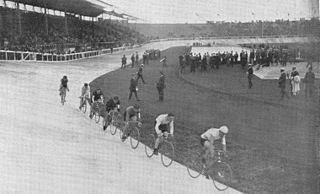
The men's 20 kilometres was one of seven track cycling events on the Cycling at the 1908 Summer Olympics programme. Its distance was the second longest of the individual event distances. Each nation could enter up to 12 cyclists.
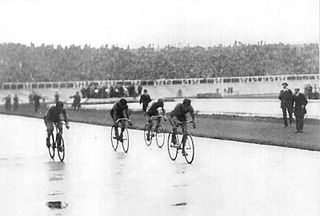
The men's 100 kilometres was one of seven track cycling events on the Cycling at the 1908 Summer Olympics programme. Its distance was the longest of the individual event distances. A challenge cup was presented by the Prince of Wales to the winner. There were 43 competitors from 11 nations. Each nation could enter up to 12 cyclists. The event was won by Charles Henry Bartlett of Great Britain, with his countryman Charles Denny finishing second. Octave Lapize earned bronze, making France the only nation to have medalists at both appearances of the 100 kilometres race.
The men's 2000 metre tandem was one of seven track cycling events on the Cycling at the 1908 Summer Olympics programme. Each nation could enter up to 6 teams of 2.
Ernest Payne was an English track cycling racer. Born in Worcester, he won a gold medal in the team pursuit at the 1908 Summer Olympics in London for Great Britain and went on to play football, including two games as an amateur for Manchester United.
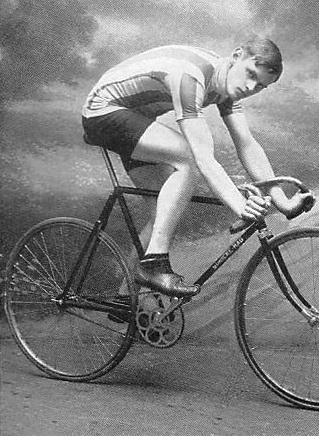
Karl Neumer was a German track cyclist. At the 1908 Olympics, he won a bronze medal in the individual sprint and a silver in the team pursuit. He also competed in the 5000 metres race, but was eliminated in the first round.
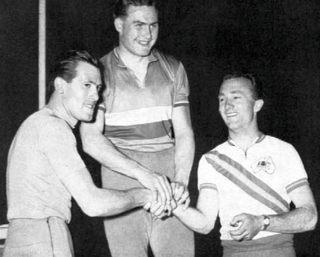
The men's sprint or "scratch race" at the 1956 Summer Olympics in Melbourne, Australia, was held from 3 to 6 December 1956. There were 18 participants representing 18 nations in competition, with one additional non-starter. Each nation was limited to one cyclist. The event was won by Michel Rousseau of France, the nation's first victory in the men's sprint since 1928 and fifth overall. Guglielmo Pesenti of Italy earned silver and Dick Ploog of Australia finished third for bronze.

The men's sprint at the 1952 Summer Olympics in Helsinki, Finland was held from July 28 to July 31, 1952. There were 27 participants from 27 nations, with each nation limited to a single cyclist. The event was won by Enzo Sacchi of Italy, the nation's second consecutive victory in the men's sprint. Lionel Cox's silver was Australia's first medal in the event. Werner Potzernheim of Germany took bronze.

The men's sprint event was part of the track cycling programme at the 1920 Summer Olympics. There were 37 competitors from 11 nations, with each nation apparently limited to four cyclists. The event was won by Maurice Peeters of the Netherlands, the nation's first victory in the men's sprint. Two British cyclists, Thomas Johnson and Harry Ryan, were in the final as well, taking silver and bronze.
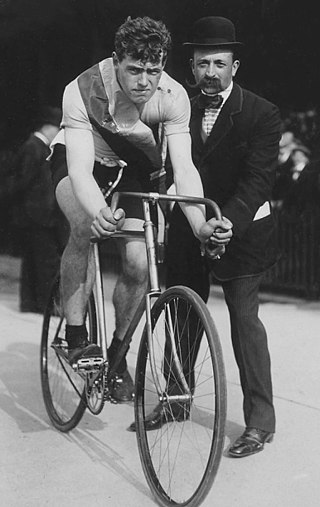
Maurice Auguste Schilles was a French track cyclist. At the 1908 Olympics he won a gold medal in the tandem, together with André Auffray, and a silver in the 5000 m event. He also competed in the sprint; in the final, the time limit was exceeded, resulting in the race being declared void and no medals being awarded. According to the official report, he won the race by inches. In the 660 yards event, he was eliminated in the first round. In the team pursuit competition, he was a member of the French team that was eliminated in the first round.
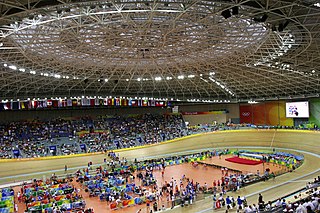
The men's sprint at the 2008 Summer Olympics took place on August 17–19 at the Laoshan Velodrome. There were 21 competitors from 15 nations, with each nation limited to two cyclists. The event was won by Chris Hoy of Great Britain, the nation's first victory in the men's sprint and first medal in the event since 1948. He faced his teammate Jason Kenny in the final, the first time since 1984 that one nation had taken the top two spots. Mickaël Bourgain of France earned bronze. Germany's four-Games podium streak ended.

The men's sprint cycling event at the 1932 Summer Olympics took place on August 1 and 3. The format was a sprint of 1000 metres. There were nine competitors from nine nations, with each nation limited to one cyclist. The event was won by Jacobus van Egmond of the Netherlands, the nation's second victory in the men's sprint. It was the fourth consecutive Games that the Netherlands reached the podium in the event. France made the podium for the third consecutive Games, with Louis Chaillot taking silver. Bruno Pellizzari gave Italy its first men's sprint medal with his bronze.
Guglielmo Morisetti was an Italian cyclist. He competed in three events at the 1908 Summer Olympics. In the semi-final of the 1,000 metres (1,100 yd) Match Sprint event, Morisetti placed two bike lengths behind heat 4 winner, Clarence Kingsbury, so did not advance to the final. In the 5,000 metres (5,500 yd) event, Morisetti placed third in heat one of open qualifying, and did not advance to the final. In the 20,000 metres (22,000 yd) event, Morisetti placed fourth in his qualifying heat, behind Arthur J. Denny (first), Charles Avrillon (second), and Gustaf Westerberg; only Denny advanced to the event final.
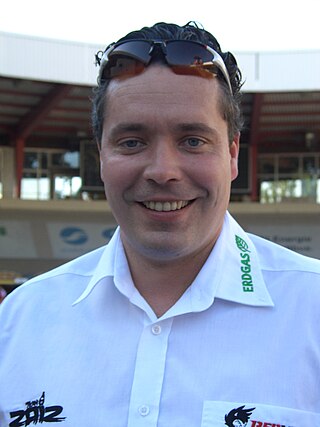
The men's sprint at the 1996 Summer Olympics (Cycling) was an event that consisted of cyclists making three laps around the track. Only the time for the last 200 metres of the 750 metres covered was counted as official time. The races were held on July 24 through July 28, 1996 at the Stone Mountain Velodrome. There were 24 competitors from 16 nations, with nations once again being allowed to have up to two cyclists each. The event was won by Jens Fiedler of Germany, the second man to successfully defend an Olympic sprint title. Curt Harnett of Canada also repeated as bronze medalist; he and Fiedler were the fifth and sixth men to win multiple medals of any color in the event. Marty Nothstein of the United States took silver, the nation's first medal in the event since 1984.

The men's sprint cycling event at the 1948 Summer Olympics took place between 7 and 9 August and was one of six events at the 1948 Olympics. There were 23 cyclists from 23 nations, with each nation limited to one competitor. The event was won by Mario Ghella of Italy, the nation's first victory in the men's sprint. Reg Harris of Great Britain, heavily favored coming into the event, finished with silver, the first medal for a British cyclist in the sprint since 1920. Axel Schandorff's bronze was Denmark's first medal in the event since 1928. The podium streaks of the Netherlands and France both ended, with neither nation's cyclist able to advance to the quarterfinals.

The men's sprint at the 1960 Summer Olympics in Rome, Italy was held on 26 to 29 August 1960. There were 30 participants from 18 nations. For the first time since 1924, nations were allowed to have more than one competitor each ; for the first time since 1924, one nation took multiple medals. Italians Sante Gaiardoni and Valentino Gasparella won gold and bronze, giving Italy a four-Games podium streak with three total gold medals—second all-time behind France's five. Leo Sterckx's silver was Belgium's first medal in the men's sprint.

The men's sprint event at the 2020 Summer Olympics took place from 4 to 6 August 2021 at the Izu Velodrome. 30 cyclists from 18 nations competed.

The women's sprint event at the 2020 Summer Olympics took place from 6 to 8 August 2021 at the Izu Velodrome. 30 cyclists from 18 nations competed. Canadian rider Kelsey Mitchell won gold, with Olena Starikova from Ukraine and Lee Wai-sze from Hong-Kong completing the medal positions.














